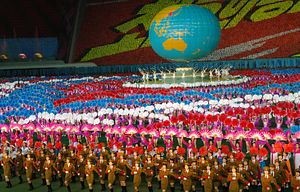This week, North Korea unveiled nearly 400 new patriotic slogans, intended to stir national pride ahead of the rare Workers’ Party of Korea congress in May. According to the Rodong Sinmun, the voice of the North Korean regime, the slogans are intended to spur enthusiasm for “epoch-making changes” in the country that will begin with the Workers’ Party congress. The congress itself is supposed to bring “earlier the final victory under the leadership of Marshal Kim Jong-un.”
I’ve selected a few of the slogans that caught my eye, but the full list is available on Rodong Sinmun‘s website:
Let’s give a decisive solution to the problem of consumer goods!
Let’s put the country on the status of an advanced one in sea fish farming by advancing into seas!
Make the foreign trade multilateral and diverse!
Let us spruce up more wonderfully the Kumsusan Palace of the Sun as befitting the holy land of the eternal sun and devotedly defend it!
Let us thoroughly implement our Party’s policy of putting all the people under arms and turning the whole country into a fortress!
Develop and produce a greater number of various means of military strike of our own style that are capable of overwhelming the enemy!
Propaganda of this sort, exclamation marks and all, has been a mainstay of the North Korean regime since the days of Kim Il-sung. In and of itself, these slogans shouldn’t be particularly newsworthy or exciting, but their relation to the Worker’s Party congress certainly is. The Seventh Congress of the Workers’ Party of Korea is being held later this year and marks the first time North Korea will hold a top-level party congress in 35 years.
In most states inspired by Marxist-Leninism or Maoism, party congresses are a far more regular occurrence and generally exist for the purpose of coordinating high-level changes to economic policy. In these countries, which often pursue dirgisme economic policy, the party congress is a useful opportunity to bring the party leadership together to consult on a wide range of issues. Additional, party congresses generally help make leadership transitions easier. In China, Vietnam, and Laos, for example, recent party congresses have filled many of the aforementioned functions.
In North Korea, a lot of this obviously doesn’t apply. The quasi-monarchist nature of the Kim family means leadership changes mostly shuffle senior leaders around and are, above all, intended to quash and purge anyone with “factionalist” inclinations who may represent an alternate locus of power to the Supreme Leader himself. In his near five years at the helm since his father died, Kim Jong-un has purged over 100 senior leaders of this sort.
Instead, as I explored earlier this month, there may be reason to believe that this year’s Workers’ Party congress will be a “traditional” Marxist-Leninist party congress in the sense that it will focus on a major program of top-down economic reform. Kim Jong-un famously revised his father’s songun, or military-first, policy around the idea of byungjin: simultaneous economic development and pursuit of a nuclear deterrent. North Korea’s belligerent kick-off to 2016, with a nuclear test and a satellite launch, fulfilled one half of the byungjin line, but the other has gone largely unaddressed. It might not be an accident that the bulk of these newly released slogans identify economic issues, including “consumer goods,” and “trade.” The country’s nuclear deterrent receives no direct mention. (Satellites do get a shout-out: “Send more satellites of Juche Korea into space!”)
Of course, this is all speculative for the moment, and the Workers’ Party congress could end up focusing on issues far more mundane. But if Kim Jong-un is serious about buttressing his ideas about byungjin, it’s not unthinkable that the upcoming party congress is about to unveil important economic reform.

































